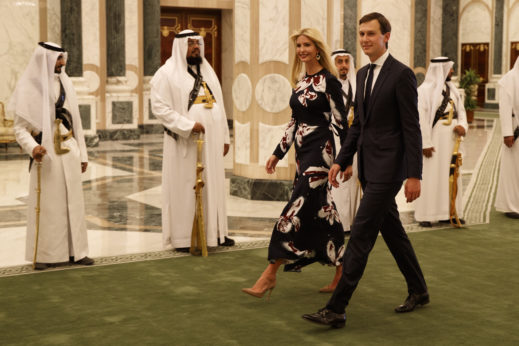
The Gulf region has seen nothing like it for decades. Saudi Arabia, which avoided the fate of other Arab regimes in the 2011 uprisings, and threw its money and support behind the overthrow of Syria’s Bashar al-Assad but failed to topple him, is in lockdown.
Crown Prince Mohammed bin Salman has dressed up his purge of rivals as an anti-corruption drive but very few believe this. He’s getting rid of all his rivals for the throne before he replaces his ailing father, King Salman. And he’s doing it with the confidence that the U.S. president is fully behind him.
“I have great confidence in King Salman and the Crown Prince of Saudi Arabia, they know exactly what they are doing,” Donald Trump tweeted when news of the supposed crackdown on corruption broke. The president’s endorsement of the wave of arrests came just a week after his son-in-law and top adviser Jared Kushner made a secret visit to Riyadh to push for “peace.”
Trump also backed the Saudi blockade of Gulf rival Qatar in June, which has failed so far to remove the ruling al-Thani family. Qatar, while also backing Sunni militancy across the region, favored the Muslim Brotherhood in Eqypt and Hamas in Gaza.
Saudi Arabia and the United Arab Emirates (UAE) favor military strongmen, such as Egypt’s Abdel Fattah el-Sissi, and see the Brotherhood as a danger to their rule.
Mohammed bin Salman became defense minister and deputy crown prince in 2015 and promptly started a war in Yemen. Two and a half years later, the poor southern neighbor is devastated, but the Houthi government in Yemen’s capital of Sanaa shows no sign of giving up.
Saudi Arabia’s allies in the south are disunited, with al-Qaida growing in power thanks to its alliance with the anti-Houthi forces supported by Riyadh and the UAE.
Which brings us to Prince Mohammed bin Salman’s power grab. The 32-year-old heir apparent became crown prince in June but has yet to achieve anything from all the mad and crazy schemes he has announced.
These include a $500 billion city called Neom fronted by a robot and promised to be a kind of Blade Runner dystopia of rampant AI capitalism.
When he was hanging out with Prince Mohammed bin Salman last month, Kushner, who is also Trump’s Israel point man, reportedly stayed up half the night strategizing with him until 4:00 am.
Clearly the current purge—which has reportedly seen two princes killed, one in a plane crash—is approved by Trump.
In return for this support, Trump is stating openly that he wants the floating of Saudi Aramco, the world’s biggest state oil firm, on the New York Stock Exchange.
This could mean other imperialist powers, such as Britain, will be sidelined in this potential bonanza. But, as some observers have stated, this coup has hit pro-Western Saudi billionaires like Al-Waleed bin Talal bin Abdulaziz al Saud.
This does not seem like an orderly move toward greater neoliberalism. Rather, it’s a naked power grab and a seizure of rivals’ assets and power bases.
History is replete with rogue rulers who seek to consolidate power by purging their opponents. But Prince Mohammed bin Salman’s purge is extraordinary for the way it has torn up the traditions of the 80-year-old kingdom, which previously rotated power among the different princes and their children, while giving each one a ministry to maintain their power and milk for billions.

The Saudi case is also dangerous for the regime’s Western backers since the stakes are so high. Britain, for instance, has backed Saudi rule since the beginning, while the U.S. guarantees it militarily while gaining access to Saudi oil.
Under Trump, this has become an alliance of U.S. crony capitalism with its Saudi counterpart, with Israel backing it behind the scenes. Their joint plan, if it can be called that, is to challenge Iran and Hezbollah across the region, starting in Lebanon.
The Lebanese prime minister, Saad Hariri, who is Saudi by passport with family money made in the kingdom, has been brought down because he was unable to challenge Hezbollah as commanded by his Saudi bosses.
Extraordinarily, he resigned while visiting Riyadh, with some sources saying he was forced. Lebanon’s government has not accepted his resignation and Hezbollah’s leader, Hassan Nasrallah, has said it was imposed on Hariri. “It was not his intention, not his wish, and not his decision” to quit, Nasrallah said in a televised address.
There is a historical comparison to be drawn with the Cold War here. The wars that began with the U.S. invasion of Iraq were supposed to eliminate all the threats to Israel in the region and to contain and overthrow the Islamic Republic of Iran.
It hasn’t quite worked out. Iran has outplayed Saudi Arabia and the U.S. in Syria and Iraq, leaving it, like the Soviet Union at the end of World War II, as a dominant power in its own backyard.
As a Gulf dissident put it to me recently, the entire British-backed Sykes-Picot agreement and the regimes it established after World War I are coming apart.
“Change here and change there are all connected,” he said. “The house of Saud replaced the Ottomans almost a century ago in the Arabian Peninsula, but like the Ottomans, their days could well be numbered.”
Morning Star










